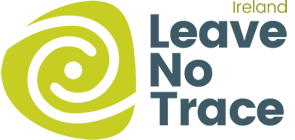Diving into the Marine Explorers Education Programme
The Explorers Education Programme promotes ocean awareness, knowledge and engagement, supporting ocean literacy and marine education in primary schools. Developed and funded by the Marine Institute, we at Leave No Trace Ireland deliver the programme in Limerick, Louth, Leitrim, Sligo, Mayo, Wexford and Donegal.
Today we’re diving into some of the history of this programme, sharing links to free resources that anyone can use, and highlighting some #SimpleActions we can all take to protect our marine environments!
What is the goal of the Explorers Programme?
The Explorers Programme’s goal is to educate and inspire primary school children! As an island nation, we have a deep cultural heritage connected to the waters around us.
As well as engaging primary school children, the programme aims to inspire the education network in Ireland to adopt more ocean literacy concepts and principles into our education systems, and to support engagement with the UN Sustainable Development Goals.
The Marine Explorers Programme is designed to share knowledge about the ocean in a meaningful way, increasing the awareness and understanding of Ireland’s marine biodiversity, the environment, as well as the opportunities and social benefits of our ocean wealth.
The Explorers Marine Project Resources
The Explorers Marine Project Resources provide great teaching materials to help develop ocean literacy in the classroom – or at home!
There are seven main project resource packs:
- Explorers Ocean Fact or Fiction
Check out the Questions & Answers Archive for all kinds of interesting information and answers to questions about the ocean and the species that live there. Do you know which fish is the fastest? Or how long lobsters live? Or what causes tides? Find out here! - Explorers Solution to Ocean Pollution
These resources span everything from what is pollution and degradation, to changes in marine infrastructure, and the circular revolution of using discarded materials from local beaches in creative projects! Find the details here. - Explorers Turtle Talk with Sea Turtles
These resources are packed with photos and fun facts about the most famous marine reptiles of all: sea turtles! Including a species profile on the largest sea turtle in the world and a regular visitor to Ireland: the leatherback turtle, turtle research and legends, and how we can help ensure turtles survive into the future, you’ll soon be an expert in “Turtle Talk”! - Explorers Learning About Squid
Put on your cephalopod science investigators cap and become a Cephalopod Science Investigating (CSI) Explorer. These resources include: Learning about Squid Dissection Film and Fun Facts, information books on Squid; Children workbooks, Kraken presentations, lesson plans and activities, plus lots more. - Explorers Deep Sea Species
The Explorers The Good, The Bad + The Ugly Deep Sea Species books and resources are suitable for 10-12 year olds and teachers who can’t wait to dive deep into the ocean depths to meet the Good, The Bad, + The Ugly residents of the deep sea.Lessons and activities have been developed to incorporate cross curricular teaching that supports the Irish national curriculum, STEM development, as well as providing children with an opportunity to develop their 21st Century skills and key competencies. The content also supports the promotion of learning about the ocean literacy principles and concepts, and a variety of SDG’s.
- Explorers STEM and STEAM Projects
The Marine Institute and the Explorers Education team supports activities involving meeting marine scientists and creating projects in schools where STEM (science, technology, engineering and maths) and STEAM (including arts) can be adopted. This section on their website provides concepts that teachers may like to develop with their classes to help students become marine champions of the future. - Explorers Ocean Literacy & SDG Resources
The Explorers resources supports the ocean literacy principles and concepts, as well as using the UN Sustainable Goals to help introduce a better understanding how the ocean has an influence on our lives and how we have an influence on the ocean. Ocean Literacy is having ‘an understanding of the ocean’s influence on us and our influence on the ocean’. An ocean-literate person: understands the importance of the ocean to humankind; can communicate about the ocean in a meaningful way; and is able to make informed and responsible decisions regarding the ocean and its resources.

